最新过去完成时和虚拟语气讲解和练习
- 格式:doc
- 大小:55.00 KB
- 文档页数:8
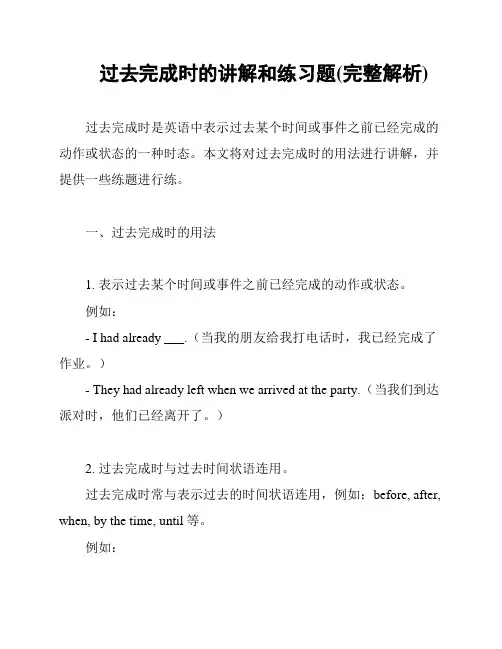
过去完成时的讲解和练习题(完整解析)过去完成时是英语中表示过去某个时间或事件之前已经完成的动作或状态的一种时态。
本文将对过去完成时的用法进行讲解,并提供一些练题进行练。
一、过去完成时的用法1. 表示过去某个时间或事件之前已经完成的动作或状态。
例如:- I had already ___.(当我的朋友给我打电话时,我已经完成了作业。
)- They had already left when we arrived at the party.(当我们到达派对时,他们已经离开了。
)2. 过去完成时与过去时间状语连用。
过去完成时常与表示过去的时间状语连用,例如:before, after, when, by the time, until等。
例如:- She had already bought the tickets before I arrived.(我到达之前,她已经买了票。
)- By the time he woke up, the sun had already risen.(他醒来时,太阳已经升起了。
)二、练题1. 根据括号中的提示,用过去完成时填空。
- When I arrived at the office, he ___ (finish) the task.(完成任务)- They _____ (leave) the party before we got there.(离开派对)- By the time I woke up, she ___ (cook) breakfast.(做早饭)2. 将以下句子改写为过去完成时。
- He had already booked the hotel before they arrived.(在他们到达之前,他已经预订了酒店。
)- We went to the cinema after they had left.(他们离开后,我们去了电影院。
)3. 根据句意,选择合适的动词完成下列句子。
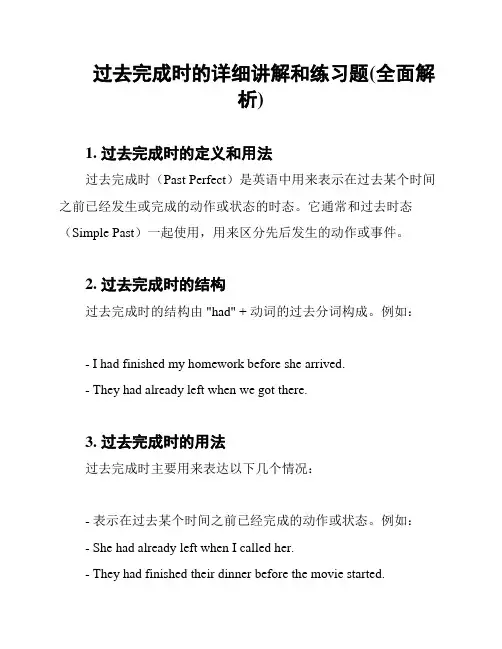
过去完成时的详细讲解和练习题(全面解析)1. 过去完成时的定义和用法过去完成时(Past Perfect)是英语中用来表示在过去某个时间之前已经发生或完成的动作或状态的时态。
它通常和过去时态(Simple Past)一起使用,用来区分先后发生的动作或事件。
2. 过去完成时的结构过去完成时的结构由 "had" + 动词的过去分词构成。
例如:- I had finished my homework before she arrived.- They had already left when we got there.3. 过去完成时的用法过去完成时主要用来表达以下几个情况:- 表示在过去某个时间之前已经完成的动作或状态。
例如:- She had already left when I called her.- They had finished their dinner before the movie started.- 用来构建时间顺序上的递进或对比关系。
例如:- He had visited many countries before he settled down in France.- I had never seen such a beautiful sunset until that day.- 用于条件句中,表示在过去某个时间之前的假设情况。
例如:- If I had known the truth, I would have acted differently.4. 过去完成时的练题请根据句意和语境,使用适当的过去完成时形式填空。
1. By the time I arrived, they __________ their dinner.2. She __________ the book before she went to bed.3. If he __________ more carefully, he wouldn't have made that mistake.4. They __________ their work before the deadline.5. We __________ all the tickets by the time you arrived.参考答案:1. had finished2. had read3. had driven 5. had sold。
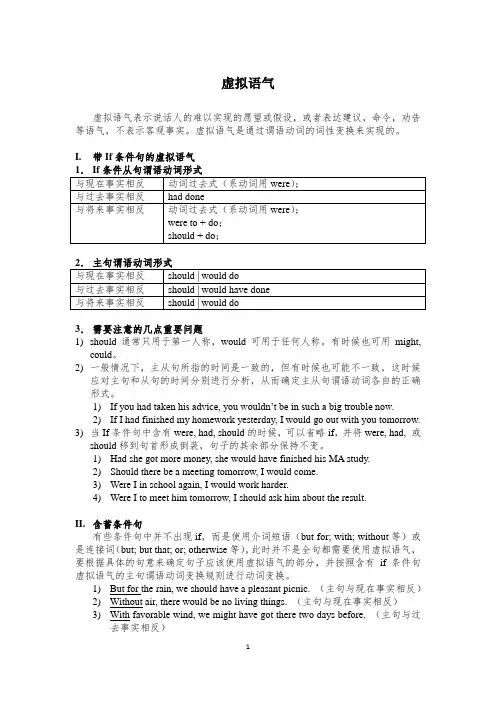
虚拟语气虚拟语气表示说话人的难以实现的愿望或假设,或者表达建议,命令,劝告等语气,不表示客观事实。
虚拟语气是通过谓语动词的词性变换来实现的。
I.带If条件句的虚拟语气3.需要注意的几点重要问题1)should通常只用于第一人称,would可用于任何人称。
有时候也可用might,could。
2)一般情况下,主从句所指的时间是一致的,但有时候也可能不一致,这时候应对主句和从句的时间分别进行分析,从而确定主从句谓语动词各自的正确形式。
1)If you had taken his advice, you wouldn’t be in such a big trouble now.2)If I had finished my homework yesterday, I would go out with you tomorrow.3)当If条件句中含有were, had, should的时候,可以省略if,并将were, had, 或should移到句首形成倒装,句子的其余部分保持不变。
1)Had she got more money, she would have finished his MA study.2)Should there be a meeting tomorrow, I would come.3)Were I in school again, I would work harder.4)Were I to meet him tomorrow, I should ask him about the result.II.含蓄条件句有些条件句中并不出现if,而是使用介词短语(but for; with; without等)或是连接词(but; but that; or; otherwise等),此时并不是全句都需要使用虚拟语气,要根据具体的句意来确定句子应该使用虚拟语气的部分,并按照含有if条件句虚拟语气的主句谓语动词变换规则进行动词变换。
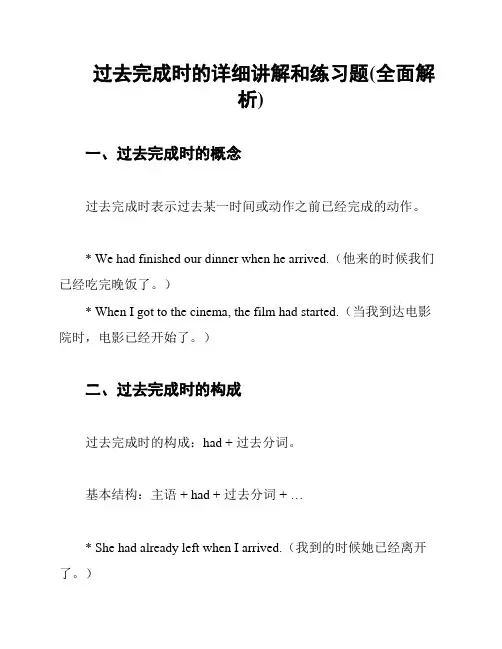
过去完成时的详细讲解和练习题(全面解析)一、过去完成时的概念过去完成时表示过去某一时间或动作之前已经完成的动作。
* We had finished our dinner when he arrived.(他来的时候我们已经吃完晚饭了。
)* When I got to the cinema, the film had started.(当我到达电影院时,电影已经开始了。
)二、过去完成时的构成过去完成时的构成:had + 过去分词。
基本结构:主语 + had + 过去分词+ …* She had already left when I arrived.(我到的时候她已经离开了。
)* I had finished my work before he called.(他打电话之前我已经完成了我的工作。
)三、过去完成时的用法1. 表示过去某个时间点之前已经完成的动作。
* They had gone out before I arrived.(我到之前他们就已经离开了。
)* She had read the book before she went to bed.(她在睡觉前已经读过那本书了。
)2. 表示过去的过去,即在过去某个时间或动作之前已经完成的动作。
常和过去时连用。
* He said that he had visited the museum before.(他说他以前去过博物馆。
)* She had finished her homework when her mother came back.(当她妈妈回来时,她已经完成了作业。
)四、过去完成时的练题1. __________(you, finish) your homework before you went to bed last night?2. By the time we arrived, the party __________(start) .3. I __________(not, see) the movie before last night.4. Before I came to China, I __________(study) Chinese for three years.5. They __________(already, leave) when I got to the station.【答案】1. Had you finished your homework before you went to bed last night?2. By the time we arrived, the party had started.3. I had not seen the movie before last night.4. Before I came to China, I had studied Chinese for three years.5. They had already left when I got to the station.。
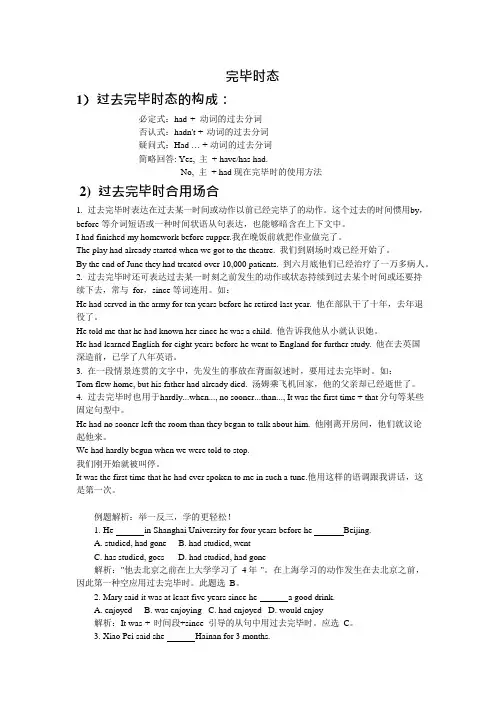
完毕时态1)过去完毕时态的构成:必定式:had +动词的过去分词否认式:hadn't + 动词的过去分词疑问式:Had … + 动词的过去分词简略回答: Yes, 主+ have/has had.No, 主+ had 现在完毕时的使用方法2)过去完毕时合用场合1.过去完毕时表达在过去某一时间或动作以前已经完毕了的动作。
这个过去的时间惯用by,before 等介词短语或一种时间状语从句表达,也能够暗含在上下文中。
I had finished my homework before supper.我在晚饭前就把作业做完了。
The play had already started when we got to the theatre. 我们到剧场时戏已经开始了。
By the end of June they had treated over 10,000 patients. 到六月底他们已经治疗了一万多病人。
2.过去完毕时还可表达过去某一时刻之前发生的动作或状态持续到过去某个时间或还要持续下去,常与for,since 等词连用。
如:He had served in the army for ten years before he retired last year. 他在部队干了十年,去年退役了。
He told me that he had known her since he was a child. 他告诉我他从小就认识她。
He had learned English for eight years before he went to England for further study. 他在去英国深造前,已学了八年英语。
3.在一段情景连贯的文字中,先发生的事放在背面叙述时,要用过去完毕时。
如:Tom flew home, but his father had already died. 汤姆乘飞机回家,他的父亲却已经逝世了。
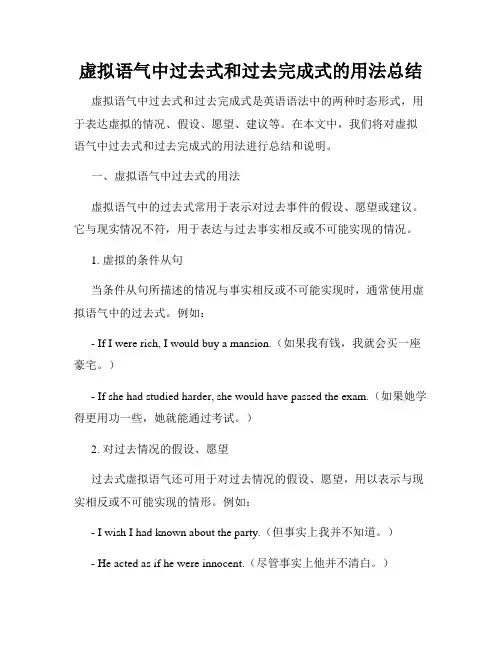
虚拟语气中过去式和过去完成式的用法总结虚拟语气中过去式和过去完成式是英语语法中的两种时态形式,用于表达虚拟的情况、假设、愿望、建议等。
在本文中,我们将对虚拟语气中过去式和过去完成式的用法进行总结和说明。
一、虚拟语气中过去式的用法虚拟语气中的过去式常用于表示对过去事件的假设、愿望或建议。
它与现实情况不符,用于表达与过去事实相反或不可能实现的情况。
1. 虚拟的条件从句当条件从句所描述的情况与事实相反或不可能实现时,通常使用虚拟语气中的过去式。
例如:- If I were rich, I would buy a mansion.(如果我有钱,我就会买一座豪宅。
)- If she had studied harder, she would have passed the exam.(如果她学得更用功一些,她就能通过考试。
)2. 对过去情况的假设、愿望过去式虚拟语气还可用于对过去情况的假设、愿望,用以表示与现实相反或不可能实现的情形。
例如:- I wish I had known about the party.(但事实上我并不知道。
)- He acted as if he were innocent.(尽管事实上他并不清白。
)3. 礼貌用语和虚拟假设在礼貌用语和虚拟假设中,虚拟语气中的过去式也常常被使用。
例如:- I would appreciate it if you could help me.(如果你能帮助我,我会非常感激。
)- It might rain, so I thought I would bring an umbrella.(虽然不确定会下雨,但我还是决定带把伞。
)二、虚拟语气中过去完成式的用法虚拟语气中的过去完成式常用于表示对过去已经发生的事实的虚拟。
它用于表示对过去发生情况的不真实假设,用以表达对过去无法改变的情况的想象。
1. 对过去的不真实假设过去完成式虚拟语气常用于对过去的不真实假设,表示对过去已经发生的事实的虚拟。
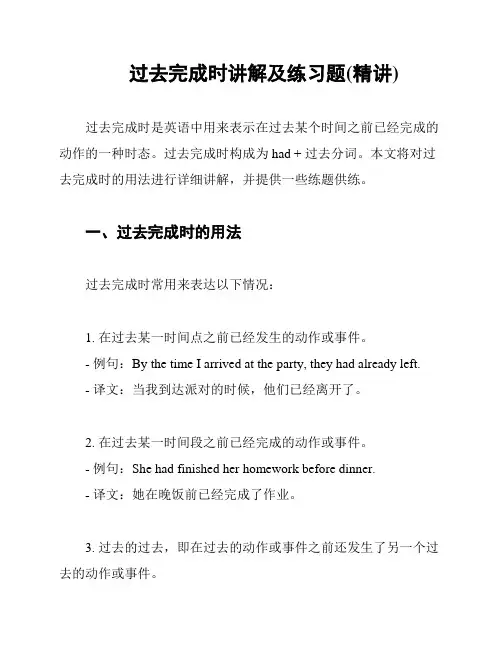
过去完成时讲解及练习题(精讲)过去完成时是英语中用来表示在过去某个时间之前已经完成的动作的一种时态。
过去完成时构成为had + 过去分词。
本文将对过去完成时的用法进行详细讲解,并提供一些练题供练。
一、过去完成时的用法过去完成时常用来表达以下情况:1. 在过去某一时间点之前已经发生的动作或事件。
- 例句:By the time I arrived at the party, they had already left.- 译文:当我到达派对的时候,他们已经离开了。
2. 在过去某一时间段之前已经完成的动作或事件。
- 例句:She had finished her homework before dinner.- 译文:她在晚饭前已经完成了作业。
3. 过去的过去,即在过去的动作或事件之前还发生了另一个过去的动作或事件。
- 例句:I realized I had left my keys at home when I arrived at the office.- 译文:当我到达办公室时,我意识到我忘记把钥匙带在家里了。
二、过去完成时的构成过去完成时的构成为had + 过去分词,无论主语是单数还是复数,形式都不发生变化。
- 积极句:Subject + had + 过去分词- 否定句:Subject + had not + 过去分词- 疑问句:Had + subject + 过去分词 + 其它?三、过去完成时练题请根据句子的意思选择正确的动词形式填空,并将填空的句子改写成过去完成时。
1. They (go) to the cinema before we (arrive).- 译文:当我们到达之前,他们已经去电影院了。
- 改写:They had gone to the cinema before we arrived.2. She (finish) her work by the time he (call) her.- 译文:当他给她打电话时,她已经完成了工作。
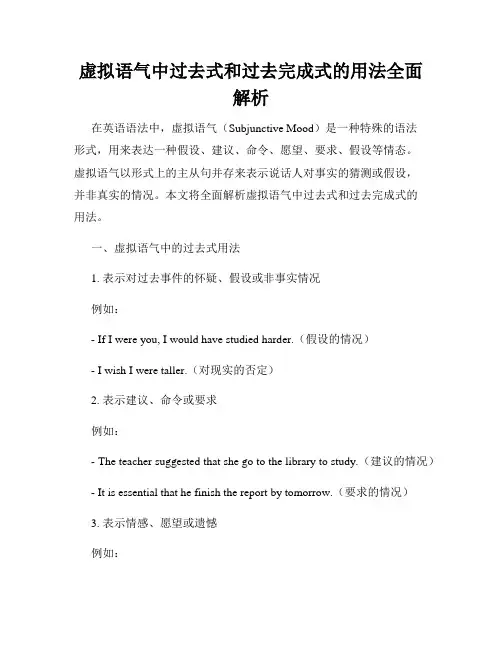
虚拟语气中过去式和过去完成式的用法全面解析在英语语法中,虚拟语气(Subjunctive Mood)是一种特殊的语法形式,用来表达一种假设、建议、命令、愿望、要求、假设等情态。
虚拟语气以形式上的主从句并存来表示说话人对事实的猜测或假设,并非真实的情况。
本文将全面解析虚拟语气中过去式和过去完成式的用法。
一、虚拟语气中的过去式用法1. 表示对过去事件的怀疑、假设或非事实情况例如:- If I were you, I would have studied harder.(假设的情况)- I wish I were taller.(对现实的否定)2. 表示建议、命令或要求例如:- The teacher suggested that she go to the library to study.(建议的情况)- It is essential that he finish the report by tomorrow.(要求的情况)3. 表示情感、愿望或遗憾例如:- I wish you hadn't lied to me.(对过去的愿望)- It's time we left.(表示感觉、愿望或遗憾)二、虚拟语气中的过去完成式用法1. 表示对过去的不实际假设例如:- If I had known the truth, I would have acted differently.(对过去的假设)2. 表示对现在的遗憾、愿望或不满意例如:- I wish I had taken more photos on my vacation.(对过去的遗憾)- If only she had not missed the train.(对现在的不满意)3. 表示对将来的假设例如:- If it were to rain tomorrow, I would have brought an umbrella.(对将来的假设)总结:以上是虚拟语气中过去式和过去完成式的主要用法。
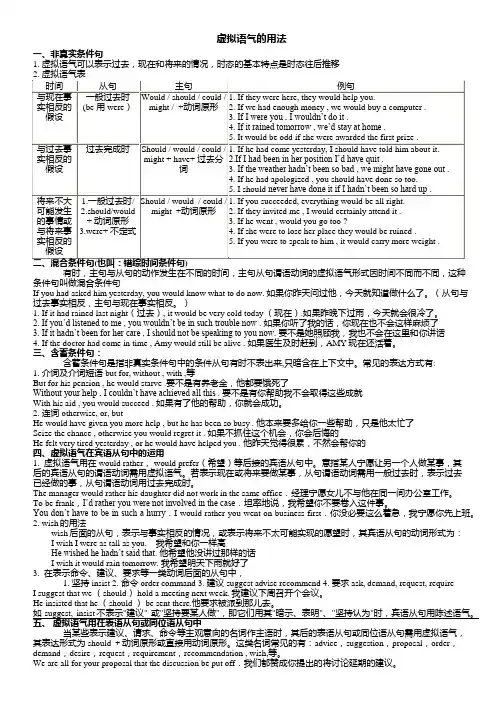
虚拟语气的用法一、非真实条件句1. 虚拟语气可以表示过去,现在和将来的情况,时态的基本特点是时态往后推移有时,主句与从句的动作发生在不同的时间,主句从句谓语动词的虚拟语气形式因时间不同而不同,这种条件句叫做混合条件句If you had asked him yesterday, you would know what to do now. 如果你昨天问过他,今天就知道做什么了。
(从句与过去事实相反,主句与现在事实相反。
)1. If it had rained last night(过去), it would be very cold today (现在).如果昨晚下过雨,今天就会很冷了。
2. If you’d listened to me , you wouldn’t be in such trouble now . 如果你听了我的话,你现在也不会这样麻烦了3. If it hadn’t been for her care , I should not be speaking to you now. 要不是她照顾我,我也不会在这里和你讲话4. If the doctor had come in time , Amy would still be alive . 如果医生及时赶到,AMY现在还活着。
三、含蓄条件句:含蓄条件句是指非真实条件句中的条件从句有时不表出来,只暗含在上下文中。
常见的表达方式有:1. 介词及介词短语 but for, without , with ,等But for his pension , he would starve .要不是有养老金,他都要饿死了Without your help , I couldn’t have achieved all this . 要不是有你帮助我不会取得这些成就With his aid , you would succeed . 如果有了他的帮助,你就会成功。
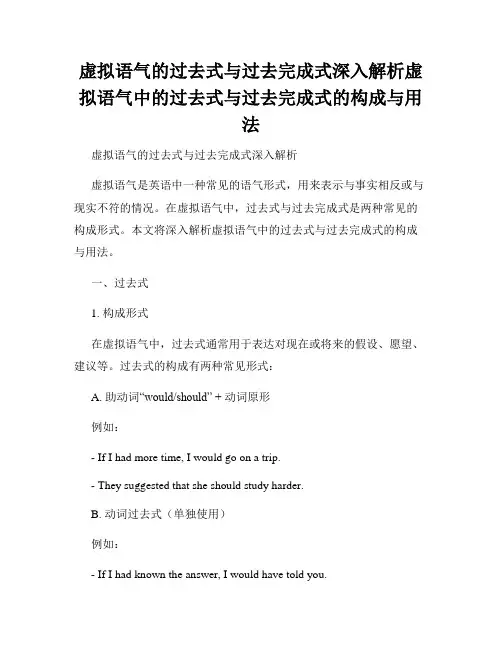
虚拟语气的过去式与过去完成式深入解析虚拟语气中的过去式与过去完成式的构成与用法虚拟语气的过去式与过去完成式深入解析虚拟语气是英语中一种常见的语气形式,用来表示与事实相反或与现实不符的情况。
在虚拟语气中,过去式与过去完成式是两种常见的构成形式。
本文将深入解析虚拟语气中的过去式与过去完成式的构成与用法。
一、过去式1. 构成形式在虚拟语气中,过去式通常用于表达对现在或将来的假设、愿望、建议等。
过去式的构成有两种常见形式:A. 助动词“would/should” + 动词原形例如:- If I had more time, I would go on a trip.- They suggested that she should study harder.B. 动词过去式(单独使用)例如:- If I had known the answer, I would have told you.- I wish I had a car.2. 用法A. 表达对现在的假设或愿望例如:- If I were a bird, I would fly in the sky.- I wish he were here.B. 表达对过去的假设或愿望例如:- If I had studied harder, I would have passed the exam.- I wish I had seen the sunset yesterday.C. 表达建议或命令的虚拟语气例如:- The teacher suggested that we should read more books.- It's better that he went home early.二、过去完成式1. 构成形式过去完成式主要用于表示对过去某个时间点之前已经发生的事情进行虚拟推测或假设。
过去完成式的构成形式为:助动词“had” + 过去分词例如:- If he had arrived earlier, we could have caught the train.- I wish I had known the truth earlier.2. 用法A. 表示过去某个时间点之前已经发生的事情例如:- The movie had already started when we got to the cinema.- By the time she arrived, he had already left.B. 表达对过去的假设或愿望例如:- If I had studied harder, I would have gotten a better grade.- I wish I had attended the party last night.C. 与虚拟语气中的过去式连用,表示对过去发生的事情的虚拟推测例如:- If I had known you were coming, I would have prepared dinner.- I wish I had brought an umbrella with me.总结:通过对虚拟语气中的过去式与过去完成式的构成与用法进行深入解析,我们可以更好地理解并正确运用这两种语态。
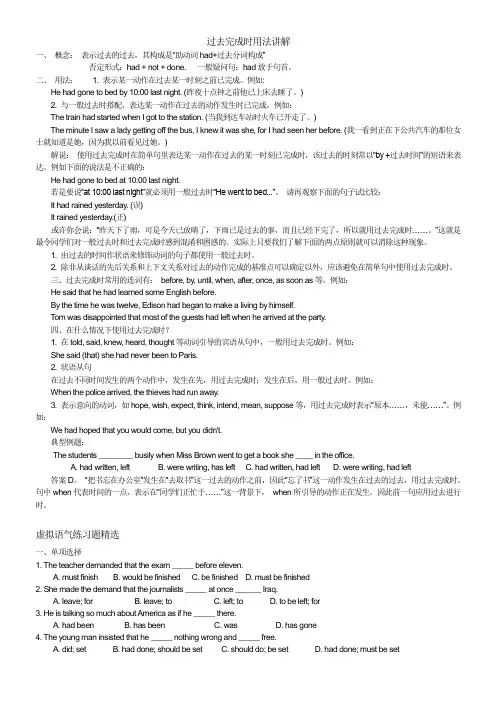
过去完成时用法讲解一、概念:表示过去的过去,其构成是"助动词had+过去分词构成”否定形式:had + not + done. 一般疑问句:had放于句首。
二、用法: 1. 表示某一动作在过去某一时刻之前已完成。
例如:He had gone to bed by 10:00 last night. (昨夜十点钟之前他已上床去睡了。
)2. 与一般过去时搭配,表达某一动作在过去的动作发生时已完成。
例如:The train had started when I got to the station. (当我到达车站时火车已开走了。
)The minute I saw a lady getting off the bus, I knew it was she, for I had seen her before. (我一看到正在下公共汽车的那位女士就知道是她,因为我以前看见过她。
)解说:使用过去完成时在简单句里表达某一动作在过去的某一时刻已完成时,该过去的时刻常以“by +过去时间”的短语来表达。
例如下面的说法是不正确的:He had gone to bed at 10:00 last night.若是要说“at 10:00 last night”就必须用一般过去时“He went to bed...”。
请再观察下面的句子试比较:It had rained yesterday. (误)It rained yesterday.(正)或许你会说:“昨天下了雨,可是今天已放晴了,下雨已是过去的事,而且已经下完了,所以就用过去完成时……。
”这就是最令同学们对一般过去时和过去完成时感到混淆和困惑的。
实际上只要我们了解下面的两点原则就可以消除这种现象。
1. 由过去的时间作状语来修饰动词的句子都使用一般过去时。
2. 除非从谈话的先后关系和上下文关系对过去的动作完成的基准点可以确定以外,应该避免在简单句中使用过去完成时。
虚拟语气讲解和练习(附答案)概念理解一、动词的语气语气用来区别讲话人对某一行为或事情的看法和态度。
英语中的语气(mood)1.陈述语气Where there is a will, there's a way. 有志者事竟成。
Can you help me carry the box upstairs 你能帮我把箱子搬到楼上吗?How I missed the life in the countryside! 我多么想念乡村的生活啊!2.祈使语气Come this way, please! 请这边走。
Don't make any noise, will you 别吵,行吗?Do be careful when crossing the street. 过马路时一定要小心。
3.虚拟语气If I were a bird, I could fly in the air. 如果我是一只小鸟,我就能在空中飞行。
I wish it were spring all the year round. 但愿四季如春。
May good luck be yours! 祝你好运!知识清单清单一、条件句中的虚拟语气A.真实条件句If he doesn't come at 8, we won't wait for him. 如果他八点不来,我们就不等他了。
If a flood happened in the past, there was usually a great loss of life and property. 过去发生洪水的话,常有很大的生命和财产损失。
We shall go there unless it rains tomorrow. 如果明天不下雨,我们将去那里。
I'll let you use my bike on condition that you keep it clean. 如果你能保持车子干净,我就让你用我的自行车。
中考英语过去完成时详解以及练习一.过去完成时详解1)概念与结构概念:过去完成时描述的是一个动作或状态在过去某一时间点之前已经完成或达到的状态。
换句话说,它表示的是“过去的过去”的动作或状态。
结构:“助动词had + 过去分词”,其中“had”是过去完成时的助动词,适用于所有人称。
2)基本用法表示过去某一时间之前已完成的动作:例句:By the end of last year, he had worked in that company for five years.(到去年年底为止,他已经在那个公司工作了五年。
)解析:此句中,“到去年年底为止”是过去的一个时间点,而“工作了五年”是在这个时间点之前完成的动作,因此使用过去完成时。
表示过去某一动作之前已完成的另一动作:例句:She had finished her homework before her mother came back.(她妈妈回来之前,她已经完成了作业。
)解析:此句中,“妈妈回来”是一个过去的动作,而“完成作业”是在这个动作之前完成的,所以“完成作业”用过去完成时。
3)与时间状语连用过去完成时经常与表示过去的时间状语连用,如“before”、“by”等。
与“before”连用:例句:He had left the house before it started raining.(下雨之前,他已经离开了家。
)解析:“下雨”是一个过去的动作,而“离开家”是在这个动作之前完成的,所以“离开家”用过去完成时。
与“by”连用:例句:By the time he was twenty, he had traveled to more than ten countries.(到他二十岁的时候,他已经去过了十多个国家。
)解析:“到他二十岁的时候”是一个过去的时间点,而“去过了十多个国家”是在这个时间点之前完成的,因此使用过去完成时。
4)在复合句中的使用过去完成时经常出现在复合句中,尤其是宾语从句和状语从句中。
虚拟语气一、考点聚焦1、虚拟语气用于条件状语从句中(1)表示与现在事实相反的假设,条件状语从句中的谓语动词用“过去式(be动词的过去式用were)”,而主句中的谓语动词用“would / should/ could / might + 动词原形”。
如:If I were a boy, I would join the army.If the had time, she should go with you.(2)表示与过去的事实相反,条件状语从句中的谓语动词用过去完成时,主句中的谓语动词则用“would / should / might / could + have +过去分词”。
如:If he had taken my advice, he would have succeeded in the competition.(3)表示与将来事实相反,条件状语从句中的谓语动词一般过去时或should(were to) + 动词原形,而主句中的谓语动词则用would / should/could might + 动词原形。
如;If it were to rain tomorrow, the football match would be put off.(4)当条件状语从句表示的行为和主句表示的行为所发生的时间不一致时,动词的形式要根据它所表示的时间作相应调整。
如:If they had worked hard, they would be very tired.(从句说的是过去,主句指的是现在)Were I a boy, I would join the army.Had he taken my advice, he would have succeeded.Were it not for the expense, I would go to Britain.2、虚拟语气用于名词性从句(1)虚拟语气在宾语从句中的运用。
完成时态1)过去完成时态的构成:肯定式:had + 动词的过去分词否定式:hadn't + 动词的过去分词疑问式:Had … + 动词的过去分词简略回答: Yes, 主 + have/has had.No, 主 + had现在完成时的用法2) 过去完成时适用场合1. 过去完成时表示在过去某一时间或动作以前已经完成了的动作。
这个过去的时间常用by,before等介词短语或一个时间状语从句表示,也可以暗含在上下文中。
I had finished my homework before supper.我在晚饭前就把作业做完了。
The play had already started when we got to the theatre. 我们到剧场时戏已经开始了。
By the end of June they had treated over 10,000 patients. 到六月底他们已经治疗了一万多病人。
2. 过去完成时还可表示过去某一时刻之前发生的动作或状态持续到过去某个时间或还要持续下去,常与for,since等词连用。
如:He had served in the army for ten years before he retired last year. 他在部队干了十年,去年退役了。
He told me that he had known her since he was a child. 他告诉我他从小就认识她。
He had learned English for eight years before he went to England for further study. 他在去英国深造前,已学了八年英语。
3. 在一段情景连贯的文字中,先发生的事放在后面叙述时,要用过去完成时。
如:Tom flew home, but his father had already died. 汤姆乘飞机回家,他的父亲却已经去世了。
(完整版)虚拟语气讲解及练习题(含答案和解释)虚拟语气讲解与练习黄志刚2013.10.一. 简介虚拟语气用来表示说话人的主观愿望或假想,而不表示客观存在的事实,所说的是一个条件,不一定是事实,或与事实相反。
虚拟语气通过谓语动词的特殊形式来表示。
英语中的语气分为陈述语气、祈使语气、虚拟语气在什么情况下用虚拟语气? 在表示虚假的、与事实相反的或难以实现的情况时用虚拟语气,表示主观愿望或表示某种强烈情感时,也用虚拟语气。
即当一个人说话时欲强调其所说的话是基于自己的主观想法,而不是根据客观实际,就用虚拟语气。
二. 虚拟语气在非真实条件状语从句中的用法1、真实条件状语从句与非真实条件状语从句真:eg . If he doesn’t hurry up, he will miss the bus. 如果他不快点,他将错过巴士。
( 真实条件状语)(不是虚拟语气)If he is free, he will ask me to tell stories. 如果他是空闲的,他会要求我讲故事。
(真实条件状语)(不是虚拟语气)非真:eg. If I were you, I would go at once.如果我是你,我马上就会去。
(非真实条件状语从句)If there were no air, people would die. 如果没有空气,人就会死亡。
(非真实条件状语从句)2、用法及动词形式1、表示与现在事实相反的情况,例1.If I were you, I would take an umbrella.如果我是你,我会带把伞。
(事实:我不可能是你) 2.If I knew his telephone number, I would tell you. 如果我知道他的电话号码,我就会告诉你。
(事实:不知道) 3.If there were no air orwater, there would be no living things on the earth. 如果没有水和空气,地球上就不会有生物。
高中英语虚拟语气讲解及练习虚拟条件句就是对现实条件的一种虚拟假设,所假设的条件一般不符合事实或与事实相反或在现实中发生的可能性极小。
根据时间的不同,虚拟条件句可分为三种,即与现在事实相反的虚拟条件句、与过去事实相反的虚拟条件句(1)表示与现在事实相反If I had enough money now, I would lend it to you.(2)表示与过去事实相反If he had taken your advice, he wouldn’t have made such a bad mistake.(3)表示与将来事实相反I would go shopping with you if it were to be Sunday tomorrow.1. 虚拟条件句的倒装在虚拟条件句中,为了强调所假设条件的虚拟性,或突出说话人的一种主观愿望,虚拟条件句可用倒装结构。
虚拟条件句的倒装是通过去掉if,把条件从句谓语中的助动词、情态动词或系动词放在句首实现的。
例如:Had I been(= If I had been ) in that situation, I would not have let the thief escape away with so much money.Should there be (= If there should be) a drought, what should we do at that time ?2. 错综时间条件句有时条件从句的动作和主句的动作发生的时间并不一致,这时谓语动词的形式应根据它所要表示的具体时间来确定。
例如:If we hadn’t been working hard in the past few years ,thing s wouldn’t be going so smoothly.3. 含蓄条件句有时假设的情况并不以条件从句的形式表现出来,而是通过某个介词或介词短语(如:with,otherwise,without,but for,in that position)、上下文或其它方式表现出来。
过去完成时注意:过去完成时表示过去某一时间或某一动作之前已经发生或完成的动作,动作发生的时间是"过去的过去".它是一个相对的时态,只有在和过去某个时间或动作相比较时才会用到。
E.g. By the end of the match,they had kicked two goals.We had already had lunch before we arrived there.其结构是"had+过去分词".它的否定句是在had后边加not,变一般疑问句是把had提前。
E.g. I had reached the station before 9:00 o'clock.I had not reached the station before 9:00 o'clock.Had you reached the station before 9:00 o'clock?它通常和before,by the end of 等引导的表示过去的时间状语连用。
1. 由时间状语来判定一般说来,各种时态都有特定的时间状语。
与过去完成时连用的时间状语有:( 1 )by + 过去的时间点。
如:I had finished reading the novel by nine o'clock last night.( 2 )by the end of + 过去的时间点。
如:We had learned over two thousand English words by the end of last term.( 3 )before + 过去的时间点。
如:They had planted six hundred trees before last Wednesday.2. 由“过去的过去”来判定。
过去完成时表示“过去的过去”,是指过去某一动作之前已经发生或完成的动作,即动作有先后关系,动作在前的用过去完成时,在后的用一般过去时。
这种用法常出现在:( 1 )宾语从句中当宾语从句的主句为一般过去时,且从句的动作先于主句的动作时,从句要用过去完成时。
在told, said, knew, heard, thought等动词后的宾语从句。
如:She said that she had seen the film before.( 2 )状语从句中在时间、条件、原因、方式等状语从句中,主、从句的动作发生有先后关系,动作在前的,要用过去完成时,动作在后的要用一般过去时。
如:After he had finished his homework, he went to bed.注意:before, after 引导的时间状语从句中,由于before 和after 本身已表达了动作的先后关系,若主、从句表示的动作紧密相连,则主、从句都用一般过去时。
如:After he closed the door, he left the classroom.(3)表示意向的动词,如hope, wish, expect, think, intend, mean, suppose等,用过去完成时表示"原本…,未能…"We had hoped that you would come, but you didn't.3. 根据上、下文来判定。
I met Wang Tao in the street yesterday. We hadn't seen each other since he went to Beijing.单项选择1.He asked me _____ during the summer holidays.A. where I had beenB. where I had goneC. where had I beenD. where had I gone2. What ____ Jane ____ by the time he was sever?A. did, doB. has, done C did, did. D. had, done3. I ______ 900 English words by the time I was ten。
A. learnedB. was learningC. had learnedD. learnt4. She ______lived here for ______ years.A. had, a fewB. has, severalC. had, a lot ofD. has, a great deal of5. By the time my parents reached home yesterday, I _____ the dinner already.A had cooked B. cooked C. have cooked D. was cooked6. She said she __________ the principle alreadyA .has seen B. saw C. will see D. had seen7. She said her family _______ themselves ______ the army during the war.A. has hidden, fromB. had hidden, fromC. has hidden, withD. had hidden, with8. By the time he was ten years old, he _________.A. has completed universityB. has completed the universityB. had completed an university D. had completed university9. She had written a number of books ______ the end of last year.A. forB. inC. byD. at10. He _____ to play ____ before he was 11 years old.A had learned, piano B. had learned, the pianoC. has learned, the pianoD. learns ,piano.用动词的适当形式填空1. We _____________ (paint) the house before we ______________ (move) in.2. That rich old man _____________ (make) a will before he _____________ (die).3. They _____________ (study) the map of the country before they ________ (leave).4. The robbers _____________ (run away ) before the policemen _______ (arrive).5. I __________ (turn off) all the lights before I ____________ (go) to bed.6. Paul __________ (go) out with Jane after he __________ (make) a phone call.虚拟语气虚拟语气表示一种假设的情况,或一种主观的愿望,即动词所表示的动作或状态并非事实,或不可能实现。
英语虚拟语气的形式有下列几种:If had the time, John would make a trip to China to see the Great Wall.If I were you, I would give up drinking immediately.If you should lose, what would you do?If I were to see her tomorrow, I would tell her the truth.If you went there next time, you would see what I mean.If I’d known that it was going to rain, I would never have gone for a walk in the country.四、虚拟语气的几种特殊用法省掉if的条件从句结构:Had you asked me, I would have told you. (=If you had asked me,…)2.有时虚拟条件不用条件从句而用不定式、分词、介词、名词、连接词或定语从句来表示,如:A true friend would not do such a thing.(=If he were a true friend, he...)(=If there were no water,…)(=If you hadn’t helped me,…)3. 有时条件从句中的动作和结果从句中的动作发生的时间不一致,如:If he had followed the doctor’s advice, he would be quite all right now.If I were you, I would have gone home.五、虚拟语气的其他用法注意:在此结构中that不可省略;should省不省均可。
He suggested that they (should ) stop smoking.上述动词的名词形式出现时,that 引导的从句仍用虚拟语气。
He made a request that they (should ) stop smoking.如果that 引导的从句所表达的内容是事实,也可用陈述语气。
He insists that he is right.It is important that you (should) follow the doctor’s orders.It is right that you should have done your homework.I wish I were a pop singer. (=I am sorry I am not a pop singer..)I wish I had never stopped teaching. (=I am sorry I stopped teaching.)I wish they’d let us get some sleep.注意:wish与hope接宾语从句的区别在于:hope表示一般可以实现的希望,宾语从句用陈述语气。